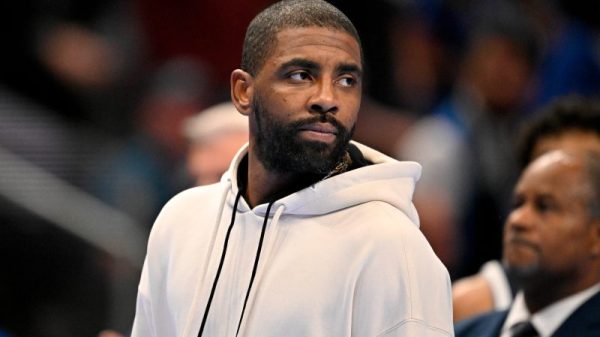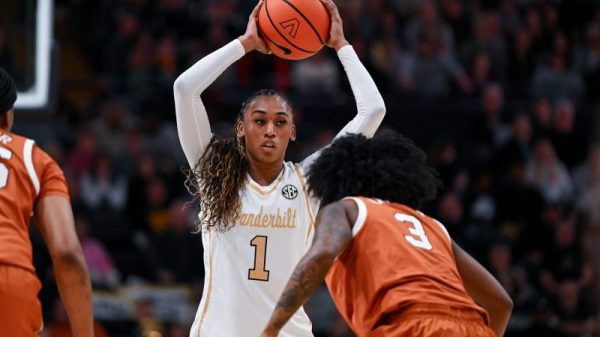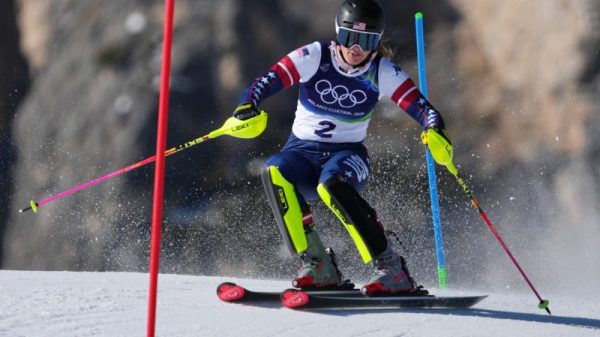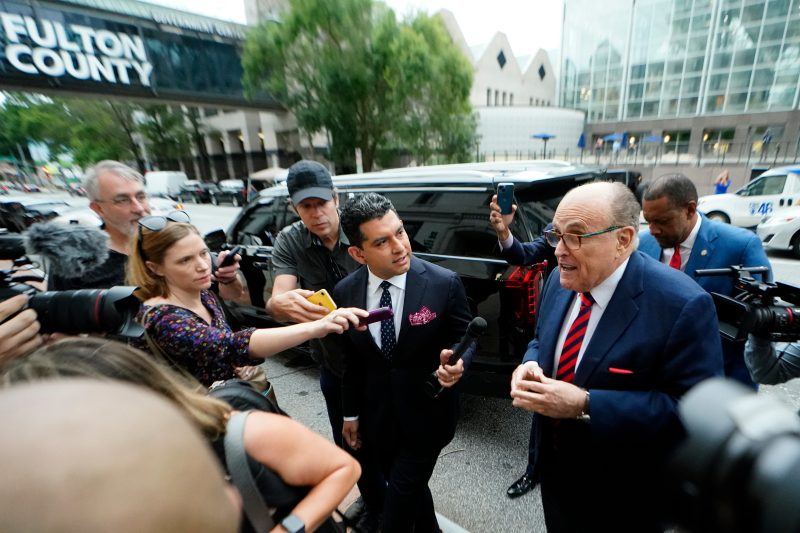Rarely in U.S. history has our judicial process invited regular people to take on a task as big as the one faced by the special grand jurors in Fulton County, Ga. They’ve taken part in investigating no less than a former president, Donald Trump, and the attempt by him and his allies to overturn the 2020 election.
And one of them has begun talking. A lot. And she is doing so in ways whose wisdom might be questionable — and in ways that Republicans could try to make into an issue.
Grand jury forewoman Emily Kohrs has offered a series of colorful and cryptic comments about the grand jury process in various interviews with print and TV media.
She has provided a window into which witnesses were cracking jokes, whether they seemed happy to be there (Georgia Gov. Brian Kemp did not) and how forthcoming they were. She noted that she swore in a witness while holding a Ninja Turtle Popsicle.
Of course, that’s not really what viewers at home are really interested in. They want to know what the grand jury found and recommended, especially when it comes to Trump and his inner circle.
All that we’ve officially learned so far, from the excerpt of its report released last week, is that the special grand jury a) suggested one or more witnesses might have committed perjury and b) that it voted unanimously that there was not voter fraud widespread enough to overturn the election results. The rest remains under seal, and the grand jurors have been instructed not to divulge details about their deliberations.
Still, Kohrs’s comments have offered some hints (and have invited ample dissection):
When the New York Times asked Kohrs whether the special grand jury recommended charging Trump, she said, “You’re not going to be shocked. It’s not rocket science.” She added: “It is not going to be some giant plot twist. You probably have a fair idea of what may be in there. I’m trying very hard to say that delicately.”On the same topic, she told CNN: “We definitely heard a lot about former president Trump, and we definitely discussed him a lot in the room. And I’ll say that, uh, when this list comes out, you wouldn’t, there are no major plot twists waiting for you.” She said she heard multiple phone calls featuring Trump’s voice.She told NBC News that the special grand jury recommended indictments for more than a dozen people and that the list “might” include Trump.When the Atlanta Journal-Constitution noted Trump claimed the initial portion of the report had exonerated him, Kohrs responded: “Did he really say that? Oh, that’s fantastic. That’s phenomenal. I love it.”
You only need to watch her CNN interview to get a sense for how Kohrs seems to be having fun with her 15 minutes of fame. (Kohrs has not responded to a request for comment.) But that doesn’t mean it’s a particularly good idea.
While analyzing that CNN interview, CNN legal commentator Elie Honig called it a “horrible idea” and a “prosecutor’s nightmare” for Kohrs to be speaking in these terms. He raised the prospect of Trump’s lawyers, if he’s indicted, moving to dismiss the charges.
And CBS News’s Robert Costa reported Wednesday morning that lawyers close to several Republican witnesses are signaling they will indeed move to quash any indictments.
Just because they will try doesn’t mean any such legal effort will succeed, of course.. And they have all kinds of motivation to cry foul over Kohrs’s comments, even if just for PR reasons.
(Trump weighed in late Wednesday morning, saying Kohrs’s media tour showed “incredibly, the Grand Jury’s inner workings & thoughts. This is not JUSTICE, this is an illegal Kangaroo Court.”)
Whether Kohrs’s comments rise to the level of offering any significant detail about the deliberations is an open question. (Georgia law requires grand jurors to take an oath saying they “shall keep the deliberations of the grand jury secret unless called upon to give evidence thereof in some court of law in this state.”) Beyond that, a separate grand jury will make any decisions on indictments, which provides some separation between the special grand jury and any potential charges.
But other experts also raised concerns, even if they come up well shy of the potential for charges to be dismissed.
“What the forewoman said in this case was nothing more than hearsay, and in theory isn’t damaging,” Columbia University law professor Jeffrey Fagan told The Washington Post. “But her statements could allow for stalling and delaying on the part of those facing indictment who might question the impartiality of the proceedings.” He added that “one might also argue that her undisciplined disclosures could reflect a similar lack of discipline in the grand jury deliberations. Lawyers for those facing indictment will exploit this to delay indictments and cast them in a negative light.”
Peter A. Joy, a law professor at Washington University in St. Louis, said that if a court found a grand juror improperly discussed deliberations, it could be significant in other ways: “It could lead to an investigation into the grand jury itself and the possibility that anyone indicted may be able to obtain a copy of the transcript of the grand jury proceedings, which would be helpful to the defense.”
Fordham University law professor Bruce A. Green added that secrecy is important when it comes to protecting those who haven’t been and won’t be charged, and also when it comes to potentially tainting future jury pools.
“The grand jury forewoman’s public discussion of the Fulton County grand jury’s work is contrary to all these conventional understandings,” Green said.
Georgia State University professor Clark D. Cunningham called it “speculative and maybe alarmist to say that the forewoman’s media appearances will be a problem for the prosecution. But the adverse effect on public confidence, I think, is clear.”
At the same time, Cunningham said that Kohrs’s comments make it more likely the special grand jury’s report will stay secret — including possibly from future grand jurors — to be on the safe side: “The D.A. might now want to consider insulating the indicting grand jury from the findings and recommendations of the report.”
Kohrs hasn’t provided firm detail when it comes to whom, specifically, the special grand jury recommended charging. And prosecutors will probably argue that talking about witnesses’ demeanors doesn’t really say much about the substance of the grand jury’s work. But sometimes her commentary has touched on specific evidence, including saying that Trump’s call to Raffensperger asking him to “find 11,780 votes” was a starting point for the jurors. None of this is shocking stuff, but these are delicate subjects.
Experts say the hypothetical problems have less to do with Kohrs talking about how many people might be indicted, or whether Trump might be, and have more to do with some other color she has provided.
She has spoken about an ice cream party thrown by the district attorney, which could lead to claims of too much fraternization. She talked about Trump White House chief of staff Mark Meadows pleading the Fifth when he was asked if he used Twitter, which could be argued was disparaging. She said the grand jury opted not to seek Trump’s testimony because it didn’t think he would offer meaningful testimony — “Trump was not a battle we picked to fight” — which Trump’s lawyers could say deprived him of a chance to clear his name.
“In this case, the judge permitted grand jurors to speak to the media and ordered them to protect only the grand jury’s deliberations, so she may not have violated the letter of the judge’s order, but her disclosures still could be damaging,” said former federal prosecutor Barbara McQuade. “In particular, her statement that she swore in a witness while holding a popsicle she obtained at an ice cream party thrown by the DA’s office suggests a level of socialization with the prosecutors that threatens the independence of the grand jury.”
In some ways, it feels unfair to scrutinize a special grand juror’s conduct like this. But the stakes are immense, especially if Trump and/or close allies are ultimately charged. And we’ve already seen how wayward actions and comments by those involved in investigating and potentially prosecuting Trump can prove significant in legal proceedings. That includes in Fulton County, where District Attorney Fani Willis was barred from investigating one of Trump’s “fake electors,” a GOP candidate for lieutenant governor, after hosting a fundraiser for his Democratic opponent.
And everyone involved should probably measure their desire to get a sense for where this process is headed against the potential impacts of getting such hints.
Matthew Brown contributed to this report.



























